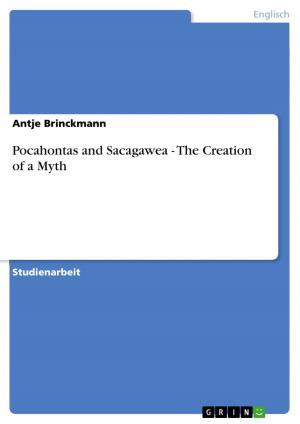Constructing National Identity in Keri Hulme's 'the bone people'
On Nation-Building Novels and the Transformative Power of Literature
Fiction & Literature, Literary Theory & Criticism, British| Author: | Vivienne Jahnke | ISBN: | 9783668161610 |
| Publisher: | GRIN Verlag | Publication: | February 26, 2016 |
| Imprint: | GRIN Verlag | Language: | English |
| Author: | Vivienne Jahnke |
| ISBN: | 9783668161610 |
| Publisher: | GRIN Verlag |
| Publication: | February 26, 2016 |
| Imprint: | GRIN Verlag |
| Language: | English |
Master's Thesis from the year 2015 in the subject English Language and Literature Studies - Literature, grade: 1,3, University of Leipzig, language: English, abstract: This thesis analyses New Zealand writer Keri Hulme's novel 'the bone people' and argues that she speaks to the core of her country's postcolonial identity crisis - and in doing so compels her fellow New Zealanders to confront the social reality in their country and to enter into the discourse of who they want to be as a nation. Accordingly, this thesis is going to analyse Hulme's writing strategies from a postcolonial viewpoint, exploring matters of identity construction on an individual as well as on a national level. Does her novel succeed as literature partaking in the nation-building process? A brief excursion into the realm of theory will provide the necessary framework for the analysis. After the in-depth discussion of 'the bone people', a comparative approach in the form of a closer look at some contemporary New Zealand writers' dealing with New Zealand's postcolonial condition will provide additional depth. Works from some of New Zealand's most renowned authors, Witi Ihimaera, Patricia Grace, Alan Duff and Eleanor Catton will be compared to 'the bone people'. Finally, a conclusion shall be drawn as to exactly how far New Zealand has come in its development as a country of bi- or even multiculturalism since the publication of 'the bone people'. It shall be discussed whether or not the novel's vision is one still relevant to New Zealand national identity today, whether the momentum the Maori gained in their agenda to revitalise their culture, out of which Hulme's novel has sprung, had more than just a ceremonial effect on the country and consequently how Hulme's vision is holding up to the reality of New Zealand in the twenty-first century.
Master's Thesis from the year 2015 in the subject English Language and Literature Studies - Literature, grade: 1,3, University of Leipzig, language: English, abstract: This thesis analyses New Zealand writer Keri Hulme's novel 'the bone people' and argues that she speaks to the core of her country's postcolonial identity crisis - and in doing so compels her fellow New Zealanders to confront the social reality in their country and to enter into the discourse of who they want to be as a nation. Accordingly, this thesis is going to analyse Hulme's writing strategies from a postcolonial viewpoint, exploring matters of identity construction on an individual as well as on a national level. Does her novel succeed as literature partaking in the nation-building process? A brief excursion into the realm of theory will provide the necessary framework for the analysis. After the in-depth discussion of 'the bone people', a comparative approach in the form of a closer look at some contemporary New Zealand writers' dealing with New Zealand's postcolonial condition will provide additional depth. Works from some of New Zealand's most renowned authors, Witi Ihimaera, Patricia Grace, Alan Duff and Eleanor Catton will be compared to 'the bone people'. Finally, a conclusion shall be drawn as to exactly how far New Zealand has come in its development as a country of bi- or even multiculturalism since the publication of 'the bone people'. It shall be discussed whether or not the novel's vision is one still relevant to New Zealand national identity today, whether the momentum the Maori gained in their agenda to revitalise their culture, out of which Hulme's novel has sprung, had more than just a ceremonial effect on the country and consequently how Hulme's vision is holding up to the reality of New Zealand in the twenty-first century.















